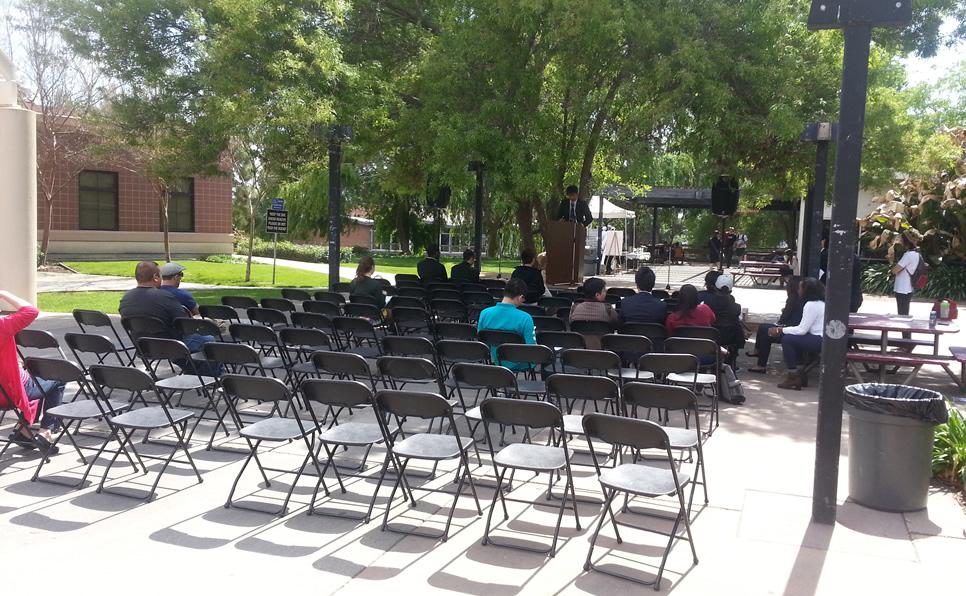They were careful, articulate speeches, poignant even. Once you got past the platitudes, there was something that made you want to root for them. This in spite of the fact that they were talking to empty seats.
That was the Associated Students of Diablo Valley College (ASDVC) Election Candidate Forum held where candidates running for executive chairs in April’s general election pitched qualifications and platform agendas to a sparse crowd comprised mostly of fellow council members.
In an effort to avoid a repeat, ASDVC’s general Elections–held April 9 and 10, from 9 a.m. to 7 p.m. at the Margaret Lesher Student Union building–promised free food to the first 500 registered students to vote. It’s not the first time ASDVC has had to dangle a carrot to stir interest.
Despite a sparse turnout, the general election results had Sam Park edge out Fiona Ajwang for President, Jonathan Passama beating Sarah Ajwang for Vice President of Executive Affairs, and Erwin Wirawan topping Mark Senatori for Controller.
Voter apathy for student government isn’t unique to DVC. San Diego State University boasts one of the largest student governments in the state, and recently reported that as little as 10% of the their 30,000 registered students voted. The numbers were less spectacular for surrounding colleges.
What’s more, the indifference isn’t limited to this semester. With the exception of an exiguous one-year blip in 2011 (due largely to the state threatening to slash $1.4 billion from higher education) voter turnout at DVC has been in steady decline for the past five years. The list below shows the downward trend for DVC:
2012: 738
2011: 917
2010: 626
2009: 1389
2008: 1201
Local sister college Los Medanos has less than half the amount of students as DVC, but the numbers reflect similar disinterest below:
2012: 30
2011: 114
2010: 6
2009: 94
2008: 5
If a food giveaway wasn’t enough to revive DVC’s turnout this year (a total of 687 votes cast), it begs the question: why are fewer students showing interest in campus politics?
Some have suggested a general perception that student government doesn’t affect them. When asked if she had interest in government on campus, English major Stephanie Torres said, “Not really. I mean if it were my actual school that I’m transferring to, maybe it would have a little more impact on me. Sadly that’s the truth.”
With over $150,000 in funding allocated to student activities, ASDVC executives contend there is much more at stake than most students are aware of. “If there was no ASDVC, there would be no one to engage in statewide issues to fight for student rights. Propositions like Prop 32 wouldn’t have been possible, and there would be a lack of student organizations and events on campus,” said Park.
The problem isn’t helped by the noticeable disconnect in government to student communication. In a DVC Inquirer website poll asking students how they felt about school politics, a majority complained they don’t feel informed enough about student government. “I care about student politics, but I feel like the election wasn’t very publicized,” said second year student Sarah Barrett.
Members of ASDVC themselves cite a lack of awareness, as well as the inability to control it. “I still don’t know how to change it. I think we need more work from our PR officer,” said Park.
Without a fund for advertising the election, candidates are left to fend for themselves, making the prospect of a campaign to reach even a quarter of the campuses’ 20,000 plus students seem futile.
DVC doesn’t fund campaign advertising, and limits the amount each student can spend on their own campaign to $150, as well as restricting the area candidates can publicize in. While DVC does send out an email through InSite WebAdvisor, the general elections are buried in a calendar of events, and the email doesn’t list candidate platforms or agendas.
The publicity problem is further compounded by the fact Associated Students of Diablo Valley College hasn’t updated their website in over a year, and DVC construction has forced ASDVC activities and forums to the outer margins of the school.
While the DVC Inquirer had announced both the candidate forum as well as the elections, its role in raising awareness is limited to a neutral observer. If ASDVC hopes to change the trend of a low voter turnout, it appears at least part of that will hinge on their ability to get their message out.
Uncontested, open seats for Vice President of Legislative Affairs went to Kevin Yuan Tian, Maxwell Wilson for Parliamentarian, Chris Dongkyun Ryu to Public Relations, Penny Luyu Peng to Activity Controller, and Ryan Yoonsung Joo to Diversity Affairs.






































































